Detailed Analysis of Business Law: Consumer Guarantees and Remedies
VerifiedAdded on 2022/12/23
|8
|1591
|72
Homework Assignment
AI Summary
This assignment analyzes a business law scenario involving consumer guarantees under the Australian Consumer Law. It examines whether a consumer, Betty, is entitled to exercise these guarantees and explores the remedies available to her. The analysis covers key provisions of the Competition and Consumer Act 2010 (CTH), including sections related to consumer definitions, misleading conduct, acceptable quality, and false representations. The assignment applies these legal principles to a case involving the purchase of wine, assessing the actions of the seller and the rights of the consumer. Furthermore, it investigates potential penalties for the business and the consumer's recourse for damages. The conclusion emphasizes Betty's rights and the business's liabilities under the law, providing a comprehensive understanding of consumer protection in this context.
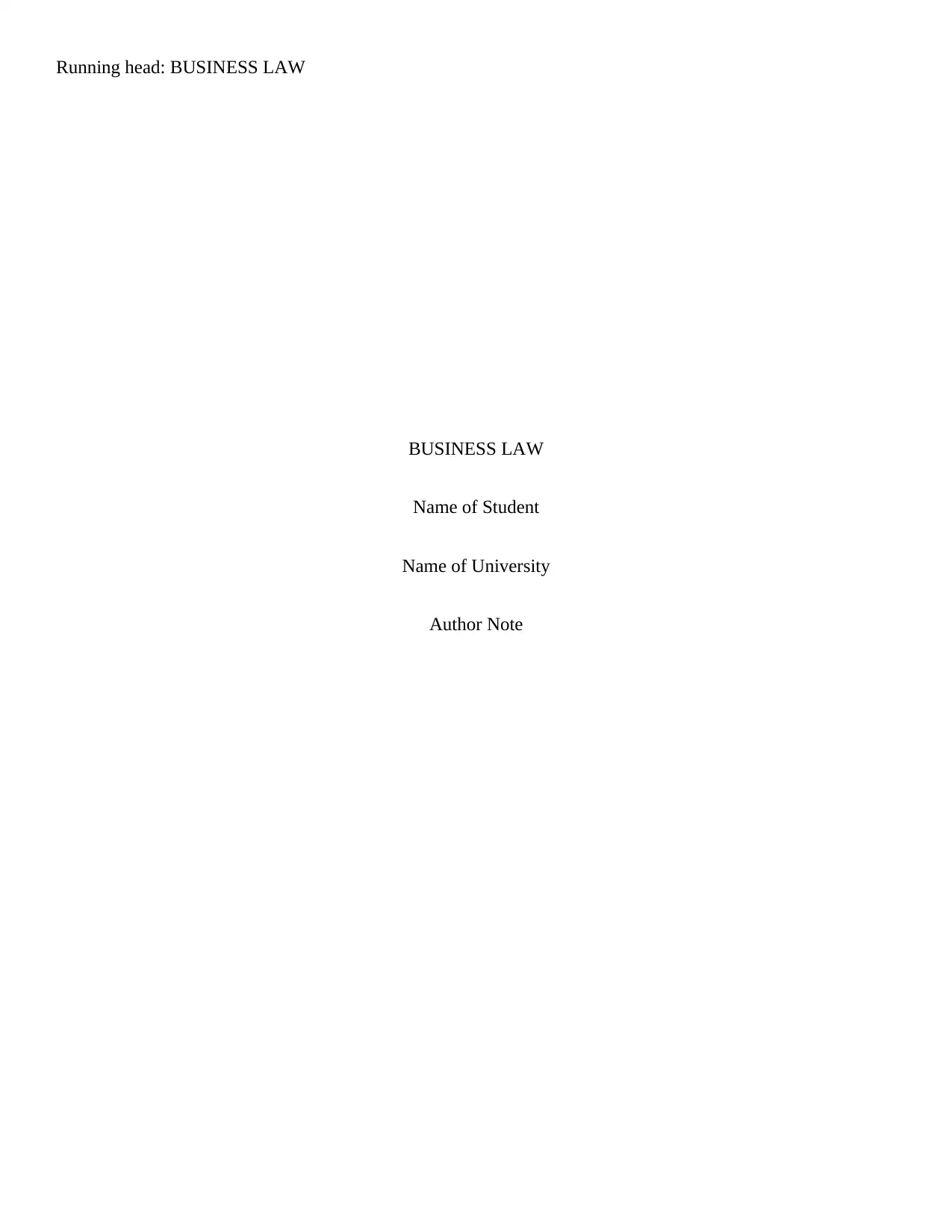
Running head: BUSINESS LAW
BUSINESS LAW
Name of Student
Name of University
Author Note
BUSINESS LAW
Name of Student
Name of University
Author Note
Paraphrase This Document
Need a fresh take? Get an instant paraphrase of this document with our AI Paraphraser
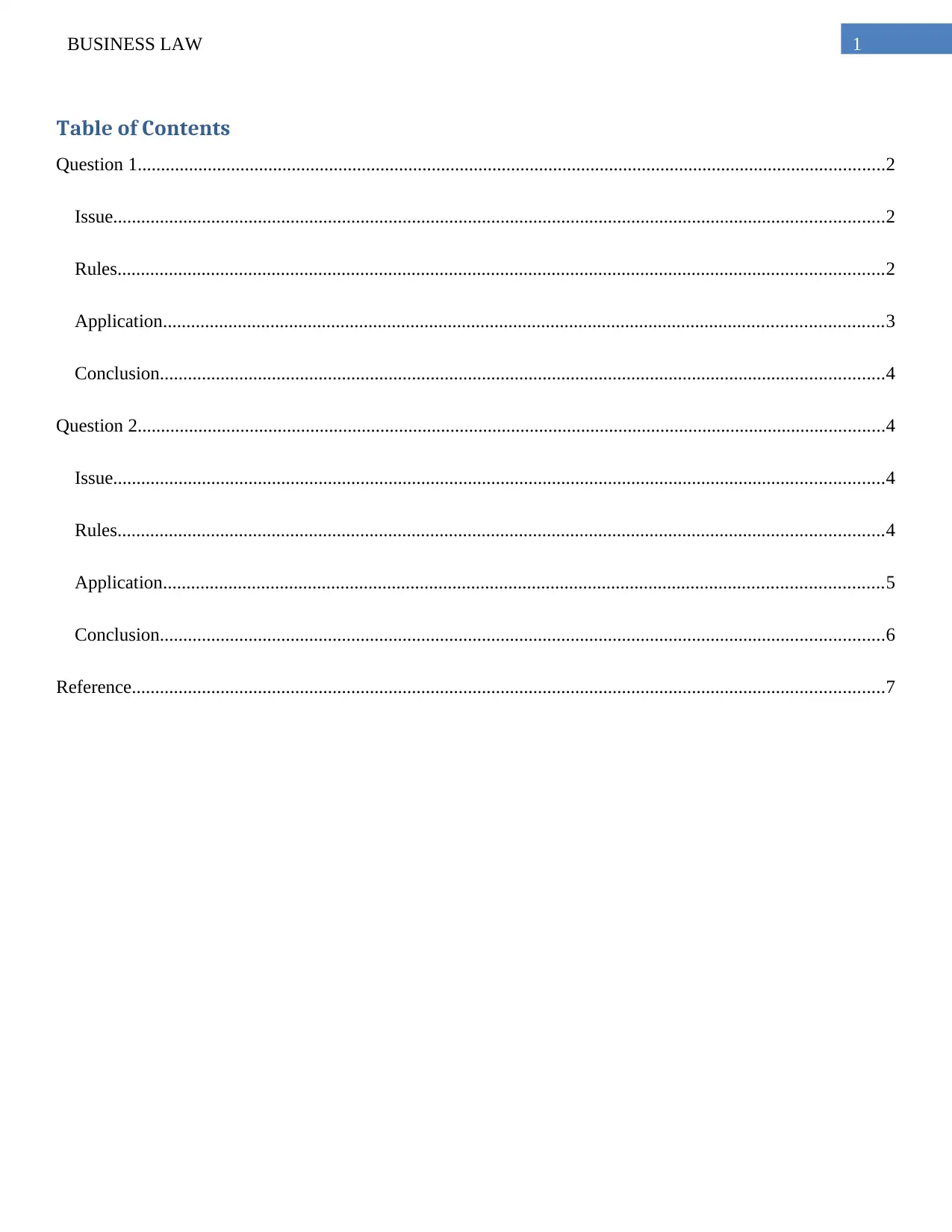
1BUSINESS LAW
Table of Contents
Question 1................................................................................................................................................................2
Issue.....................................................................................................................................................................2
Rules....................................................................................................................................................................2
Application..........................................................................................................................................................3
Conclusion...........................................................................................................................................................4
Question 2................................................................................................................................................................4
Issue.....................................................................................................................................................................4
Rules....................................................................................................................................................................4
Application..........................................................................................................................................................5
Conclusion...........................................................................................................................................................6
Reference.................................................................................................................................................................7
Table of Contents
Question 1................................................................................................................................................................2
Issue.....................................................................................................................................................................2
Rules....................................................................................................................................................................2
Application..........................................................................................................................................................3
Conclusion...........................................................................................................................................................4
Question 2................................................................................................................................................................4
Issue.....................................................................................................................................................................4
Rules....................................................................................................................................................................4
Application..........................................................................................................................................................5
Conclusion...........................................................................................................................................................6
Reference.................................................................................................................................................................7
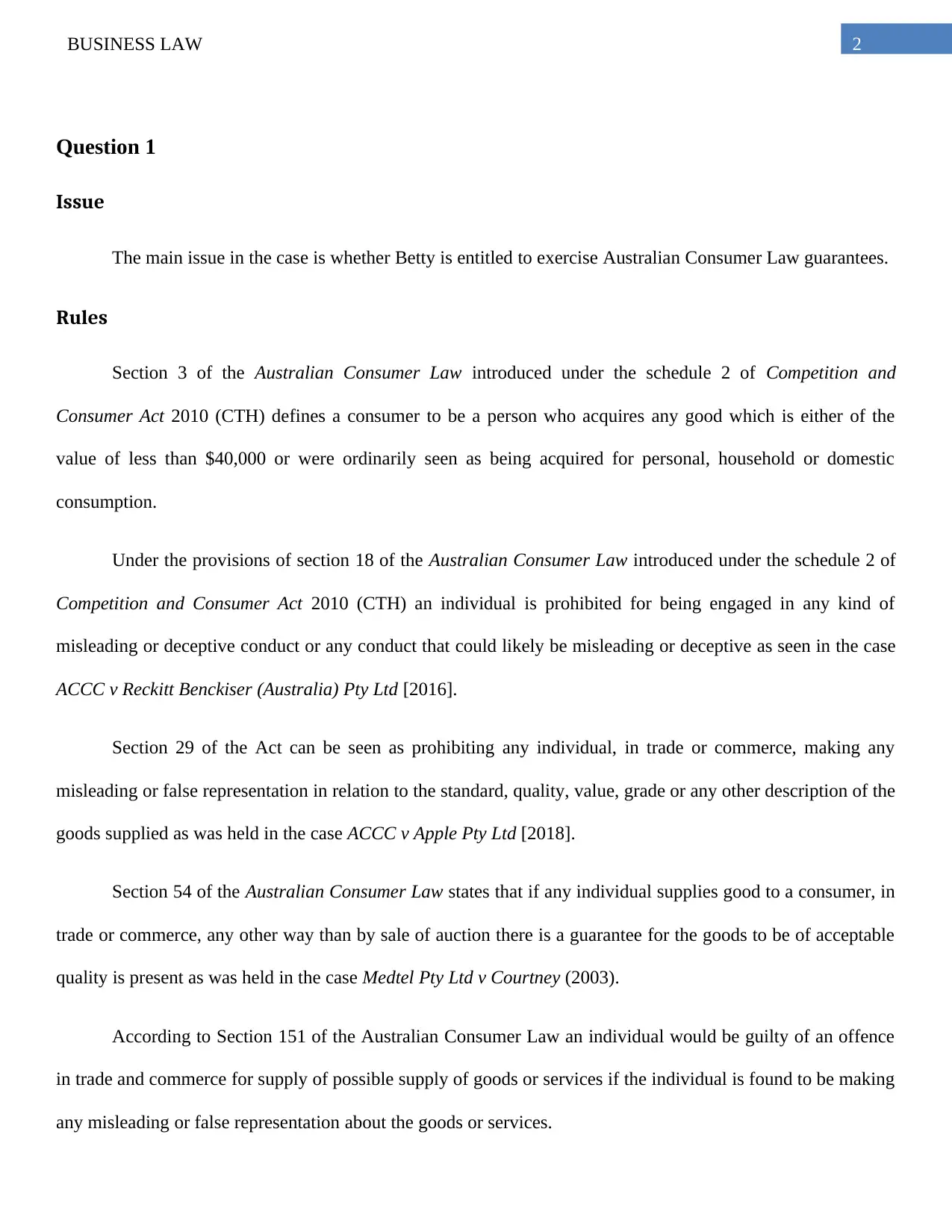
2BUSINESS LAW
Question 1
Issue
The main issue in the case is whether Betty is entitled to exercise Australian Consumer Law guarantees.
Rules
Section 3 of the Australian Consumer Law introduced under the schedule 2 of Competition and
Consumer Act 2010 (CTH) defines a consumer to be a person who acquires any good which is either of the
value of less than $40,000 or were ordinarily seen as being acquired for personal, household or domestic
consumption.
Under the provisions of section 18 of the Australian Consumer Law introduced under the schedule 2 of
Competition and Consumer Act 2010 (CTH) an individual is prohibited for being engaged in any kind of
misleading or deceptive conduct or any conduct that could likely be misleading or deceptive as seen in the case
ACCC v Reckitt Benckiser (Australia) Pty Ltd [2016].
Section 29 of the Act can be seen as prohibiting any individual, in trade or commerce, making any
misleading or false representation in relation to the standard, quality, value, grade or any other description of the
goods supplied as was held in the case ACCC v Apple Pty Ltd [2018].
Section 54 of the Australian Consumer Law states that if any individual supplies good to a consumer, in
trade or commerce, any other way than by sale of auction there is a guarantee for the goods to be of acceptable
quality is present as was held in the case Medtel Pty Ltd v Courtney (2003).
According to Section 151 of the Australian Consumer Law an individual would be guilty of an offence
in trade and commerce for supply of possible supply of goods or services if the individual is found to be making
any misleading or false representation about the goods or services.
Question 1
Issue
The main issue in the case is whether Betty is entitled to exercise Australian Consumer Law guarantees.
Rules
Section 3 of the Australian Consumer Law introduced under the schedule 2 of Competition and
Consumer Act 2010 (CTH) defines a consumer to be a person who acquires any good which is either of the
value of less than $40,000 or were ordinarily seen as being acquired for personal, household or domestic
consumption.
Under the provisions of section 18 of the Australian Consumer Law introduced under the schedule 2 of
Competition and Consumer Act 2010 (CTH) an individual is prohibited for being engaged in any kind of
misleading or deceptive conduct or any conduct that could likely be misleading or deceptive as seen in the case
ACCC v Reckitt Benckiser (Australia) Pty Ltd [2016].
Section 29 of the Act can be seen as prohibiting any individual, in trade or commerce, making any
misleading or false representation in relation to the standard, quality, value, grade or any other description of the
goods supplied as was held in the case ACCC v Apple Pty Ltd [2018].
Section 54 of the Australian Consumer Law states that if any individual supplies good to a consumer, in
trade or commerce, any other way than by sale of auction there is a guarantee for the goods to be of acceptable
quality is present as was held in the case Medtel Pty Ltd v Courtney (2003).
According to Section 151 of the Australian Consumer Law an individual would be guilty of an offence
in trade and commerce for supply of possible supply of goods or services if the individual is found to be making
any misleading or false representation about the goods or services.
⊘ This is a preview!⊘
Do you want full access?
Subscribe today to unlock all pages.

Trusted by 1+ million students worldwide
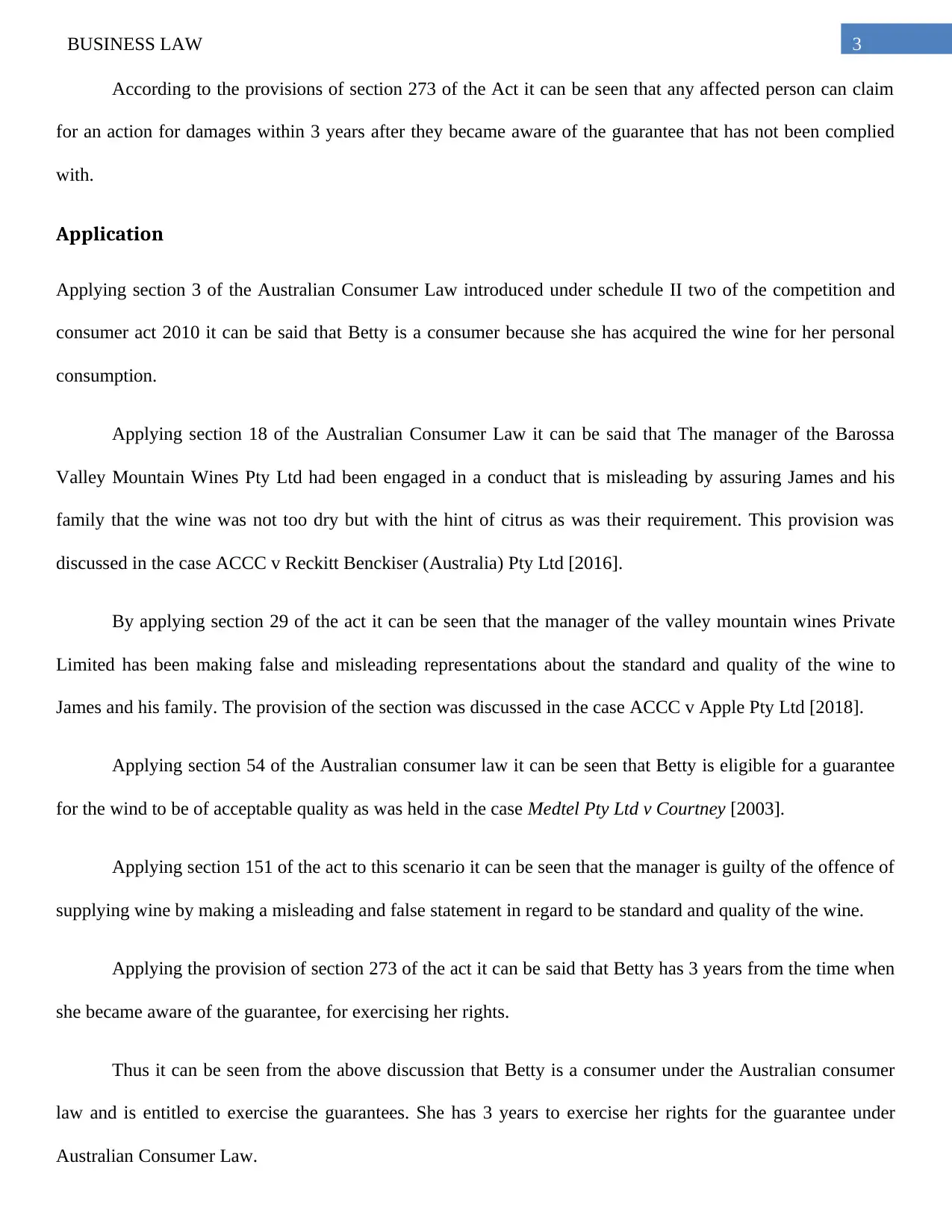
3BUSINESS LAW
According to the provisions of section 273 of the Act it can be seen that any affected person can claim
for an action for damages within 3 years after they became aware of the guarantee that has not been complied
with.
Application
Applying section 3 of the Australian Consumer Law introduced under schedule II two of the competition and
consumer act 2010 it can be said that Betty is a consumer because she has acquired the wine for her personal
consumption.
Applying section 18 of the Australian Consumer Law it can be said that The manager of the Barossa
Valley Mountain Wines Pty Ltd had been engaged in a conduct that is misleading by assuring James and his
family that the wine was not too dry but with the hint of citrus as was their requirement. This provision was
discussed in the case ACCC v Reckitt Benckiser (Australia) Pty Ltd [2016].
By applying section 29 of the act it can be seen that the manager of the valley mountain wines Private
Limited has been making false and misleading representations about the standard and quality of the wine to
James and his family. The provision of the section was discussed in the case ACCC v Apple Pty Ltd [2018].
Applying section 54 of the Australian consumer law it can be seen that Betty is eligible for a guarantee
for the wind to be of acceptable quality as was held in the case Medtel Pty Ltd v Courtney [2003].
Applying section 151 of the act to this scenario it can be seen that the manager is guilty of the offence of
supplying wine by making a misleading and false statement in regard to be standard and quality of the wine.
Applying the provision of section 273 of the act it can be said that Betty has 3 years from the time when
she became aware of the guarantee, for exercising her rights.
Thus it can be seen from the above discussion that Betty is a consumer under the Australian consumer
law and is entitled to exercise the guarantees. She has 3 years to exercise her rights for the guarantee under
Australian Consumer Law.
According to the provisions of section 273 of the Act it can be seen that any affected person can claim
for an action for damages within 3 years after they became aware of the guarantee that has not been complied
with.
Application
Applying section 3 of the Australian Consumer Law introduced under schedule II two of the competition and
consumer act 2010 it can be said that Betty is a consumer because she has acquired the wine for her personal
consumption.
Applying section 18 of the Australian Consumer Law it can be said that The manager of the Barossa
Valley Mountain Wines Pty Ltd had been engaged in a conduct that is misleading by assuring James and his
family that the wine was not too dry but with the hint of citrus as was their requirement. This provision was
discussed in the case ACCC v Reckitt Benckiser (Australia) Pty Ltd [2016].
By applying section 29 of the act it can be seen that the manager of the valley mountain wines Private
Limited has been making false and misleading representations about the standard and quality of the wine to
James and his family. The provision of the section was discussed in the case ACCC v Apple Pty Ltd [2018].
Applying section 54 of the Australian consumer law it can be seen that Betty is eligible for a guarantee
for the wind to be of acceptable quality as was held in the case Medtel Pty Ltd v Courtney [2003].
Applying section 151 of the act to this scenario it can be seen that the manager is guilty of the offence of
supplying wine by making a misleading and false statement in regard to be standard and quality of the wine.
Applying the provision of section 273 of the act it can be said that Betty has 3 years from the time when
she became aware of the guarantee, for exercising her rights.
Thus it can be seen from the above discussion that Betty is a consumer under the Australian consumer
law and is entitled to exercise the guarantees. She has 3 years to exercise her rights for the guarantee under
Australian Consumer Law.
Paraphrase This Document
Need a fresh take? Get an instant paraphrase of this document with our AI Paraphraser
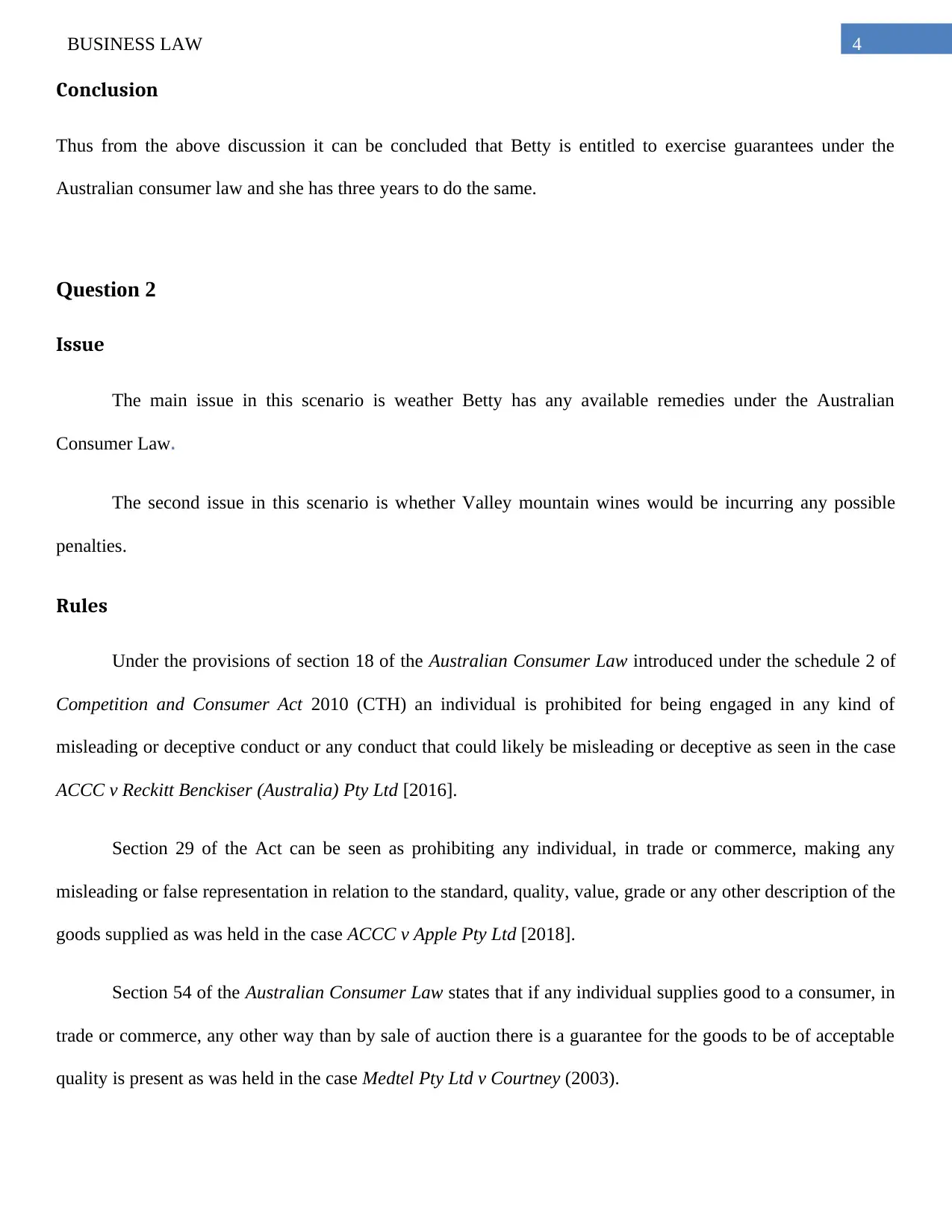
4BUSINESS LAW
Conclusion
Thus from the above discussion it can be concluded that Betty is entitled to exercise guarantees under the
Australian consumer law and she has three years to do the same.
Question 2
Issue
The main issue in this scenario is weather Betty has any available remedies under the Australian
Consumer Law.
The second issue in this scenario is whether Valley mountain wines would be incurring any possible
penalties.
Rules
Under the provisions of section 18 of the Australian Consumer Law introduced under the schedule 2 of
Competition and Consumer Act 2010 (CTH) an individual is prohibited for being engaged in any kind of
misleading or deceptive conduct or any conduct that could likely be misleading or deceptive as seen in the case
ACCC v Reckitt Benckiser (Australia) Pty Ltd [2016].
Section 29 of the Act can be seen as prohibiting any individual, in trade or commerce, making any
misleading or false representation in relation to the standard, quality, value, grade or any other description of the
goods supplied as was held in the case ACCC v Apple Pty Ltd [2018].
Section 54 of the Australian Consumer Law states that if any individual supplies good to a consumer, in
trade or commerce, any other way than by sale of auction there is a guarantee for the goods to be of acceptable
quality is present as was held in the case Medtel Pty Ltd v Courtney (2003).
Conclusion
Thus from the above discussion it can be concluded that Betty is entitled to exercise guarantees under the
Australian consumer law and she has three years to do the same.
Question 2
Issue
The main issue in this scenario is weather Betty has any available remedies under the Australian
Consumer Law.
The second issue in this scenario is whether Valley mountain wines would be incurring any possible
penalties.
Rules
Under the provisions of section 18 of the Australian Consumer Law introduced under the schedule 2 of
Competition and Consumer Act 2010 (CTH) an individual is prohibited for being engaged in any kind of
misleading or deceptive conduct or any conduct that could likely be misleading or deceptive as seen in the case
ACCC v Reckitt Benckiser (Australia) Pty Ltd [2016].
Section 29 of the Act can be seen as prohibiting any individual, in trade or commerce, making any
misleading or false representation in relation to the standard, quality, value, grade or any other description of the
goods supplied as was held in the case ACCC v Apple Pty Ltd [2018].
Section 54 of the Australian Consumer Law states that if any individual supplies good to a consumer, in
trade or commerce, any other way than by sale of auction there is a guarantee for the goods to be of acceptable
quality is present as was held in the case Medtel Pty Ltd v Courtney (2003).
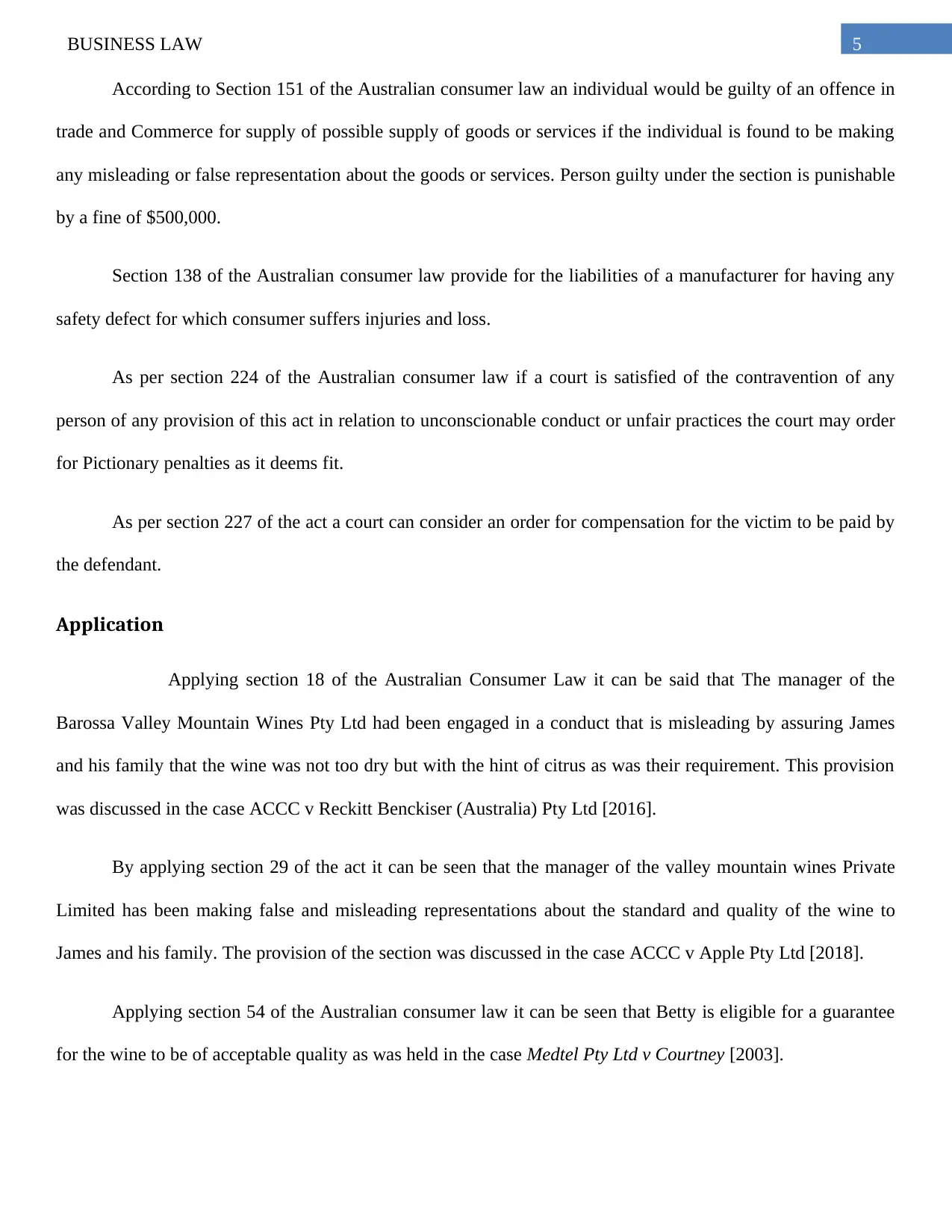
5BUSINESS LAW
According to Section 151 of the Australian consumer law an individual would be guilty of an offence in
trade and Commerce for supply of possible supply of goods or services if the individual is found to be making
any misleading or false representation about the goods or services. Person guilty under the section is punishable
by a fine of $500,000.
Section 138 of the Australian consumer law provide for the liabilities of a manufacturer for having any
safety defect for which consumer suffers injuries and loss.
As per section 224 of the Australian consumer law if a court is satisfied of the contravention of any
person of any provision of this act in relation to unconscionable conduct or unfair practices the court may order
for Pictionary penalties as it deems fit.
As per section 227 of the act a court can consider an order for compensation for the victim to be paid by
the defendant.
Application
Applying section 18 of the Australian Consumer Law it can be said that The manager of the
Barossa Valley Mountain Wines Pty Ltd had been engaged in a conduct that is misleading by assuring James
and his family that the wine was not too dry but with the hint of citrus as was their requirement. This provision
was discussed in the case ACCC v Reckitt Benckiser (Australia) Pty Ltd [2016].
By applying section 29 of the act it can be seen that the manager of the valley mountain wines Private
Limited has been making false and misleading representations about the standard and quality of the wine to
James and his family. The provision of the section was discussed in the case ACCC v Apple Pty Ltd [2018].
Applying section 54 of the Australian consumer law it can be seen that Betty is eligible for a guarantee
for the wine to be of acceptable quality as was held in the case Medtel Pty Ltd v Courtney [2003].
According to Section 151 of the Australian consumer law an individual would be guilty of an offence in
trade and Commerce for supply of possible supply of goods or services if the individual is found to be making
any misleading or false representation about the goods or services. Person guilty under the section is punishable
by a fine of $500,000.
Section 138 of the Australian consumer law provide for the liabilities of a manufacturer for having any
safety defect for which consumer suffers injuries and loss.
As per section 224 of the Australian consumer law if a court is satisfied of the contravention of any
person of any provision of this act in relation to unconscionable conduct or unfair practices the court may order
for Pictionary penalties as it deems fit.
As per section 227 of the act a court can consider an order for compensation for the victim to be paid by
the defendant.
Application
Applying section 18 of the Australian Consumer Law it can be said that The manager of the
Barossa Valley Mountain Wines Pty Ltd had been engaged in a conduct that is misleading by assuring James
and his family that the wine was not too dry but with the hint of citrus as was their requirement. This provision
was discussed in the case ACCC v Reckitt Benckiser (Australia) Pty Ltd [2016].
By applying section 29 of the act it can be seen that the manager of the valley mountain wines Private
Limited has been making false and misleading representations about the standard and quality of the wine to
James and his family. The provision of the section was discussed in the case ACCC v Apple Pty Ltd [2018].
Applying section 54 of the Australian consumer law it can be seen that Betty is eligible for a guarantee
for the wine to be of acceptable quality as was held in the case Medtel Pty Ltd v Courtney [2003].
⊘ This is a preview!⊘
Do you want full access?
Subscribe today to unlock all pages.

Trusted by 1+ million students worldwide
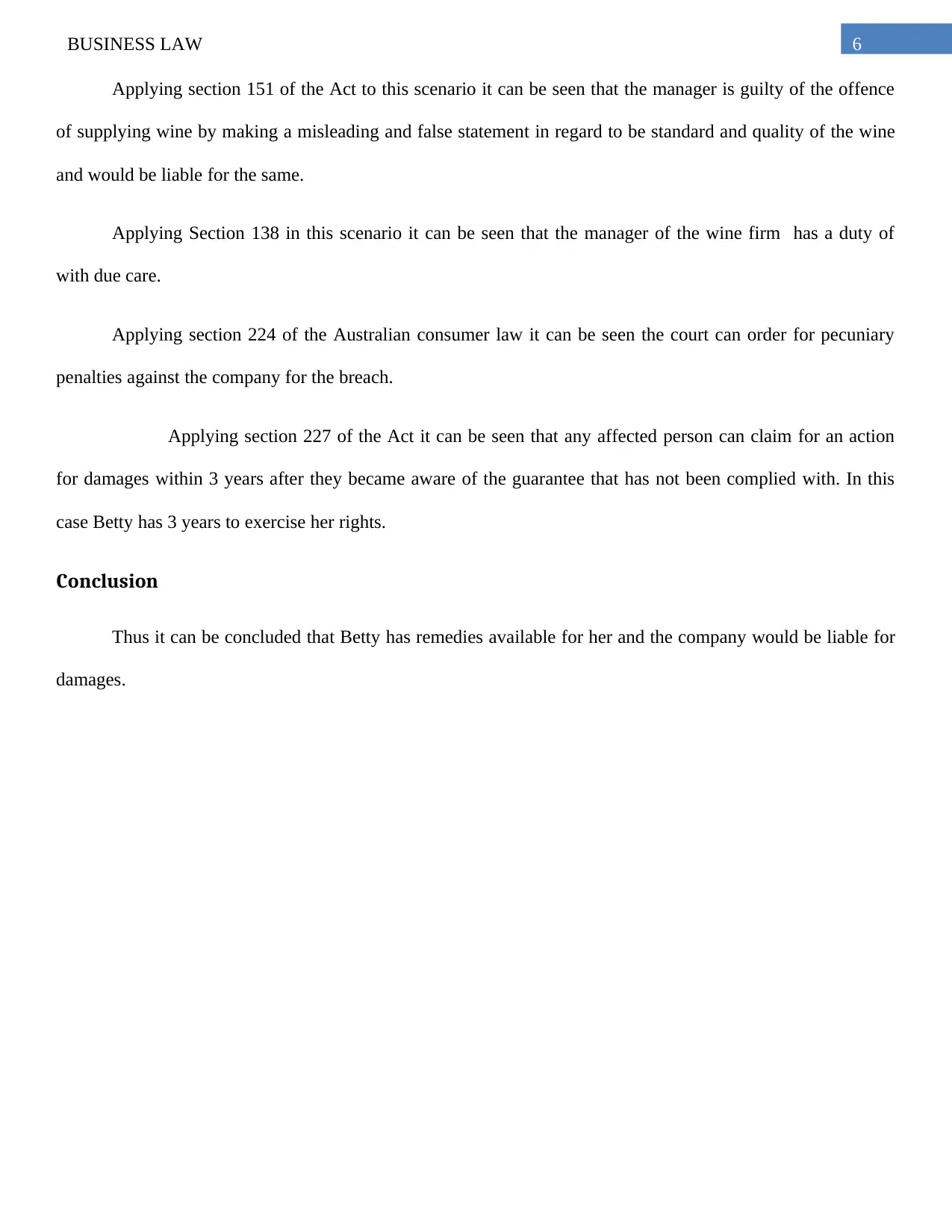
6BUSINESS LAW
Applying section 151 of the Act to this scenario it can be seen that the manager is guilty of the offence
of supplying wine by making a misleading and false statement in regard to be standard and quality of the wine
and would be liable for the same.
Applying Section 138 in this scenario it can be seen that the manager of the wine firm has a duty of
with due care.
Applying section 224 of the Australian consumer law it can be seen the court can order for pecuniary
penalties against the company for the breach.
Applying section 227 of the Act it can be seen that any affected person can claim for an action
for damages within 3 years after they became aware of the guarantee that has not been complied with. In this
case Betty has 3 years to exercise her rights.
Conclusion
Thus it can be concluded that Betty has remedies available for her and the company would be liable for
damages.
Applying section 151 of the Act to this scenario it can be seen that the manager is guilty of the offence
of supplying wine by making a misleading and false statement in regard to be standard and quality of the wine
and would be liable for the same.
Applying Section 138 in this scenario it can be seen that the manager of the wine firm has a duty of
with due care.
Applying section 224 of the Australian consumer law it can be seen the court can order for pecuniary
penalties against the company for the breach.
Applying section 227 of the Act it can be seen that any affected person can claim for an action
for damages within 3 years after they became aware of the guarantee that has not been complied with. In this
case Betty has 3 years to exercise her rights.
Conclusion
Thus it can be concluded that Betty has remedies available for her and the company would be liable for
damages.
Paraphrase This Document
Need a fresh take? Get an instant paraphrase of this document with our AI Paraphraser
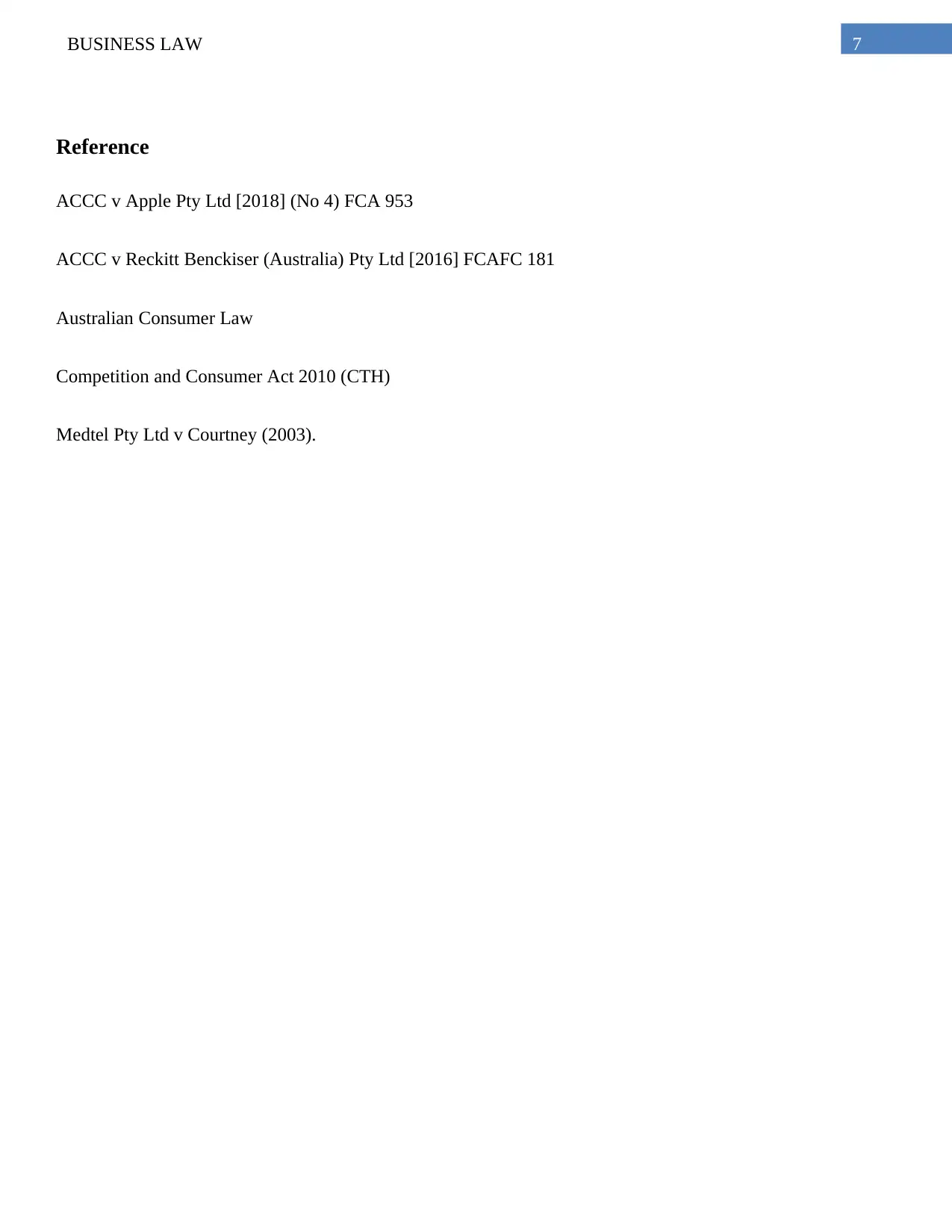
7BUSINESS LAW
Reference
ACCC v Apple Pty Ltd [2018] (No 4) FCA 953
ACCC v Reckitt Benckiser (Australia) Pty Ltd [2016] FCAFC 181
Australian Consumer Law
Competition and Consumer Act 2010 (CTH)
Medtel Pty Ltd v Courtney (2003).
Reference
ACCC v Apple Pty Ltd [2018] (No 4) FCA 953
ACCC v Reckitt Benckiser (Australia) Pty Ltd [2016] FCAFC 181
Australian Consumer Law
Competition and Consumer Act 2010 (CTH)
Medtel Pty Ltd v Courtney (2003).
1 out of 8
Related Documents
Your All-in-One AI-Powered Toolkit for Academic Success.
+13062052269
info@desklib.com
Available 24*7 on WhatsApp / Email
![[object Object]](/_next/static/media/star-bottom.7253800d.svg)
Unlock your academic potential
Copyright © 2020–2026 A2Z Services. All Rights Reserved. Developed and managed by ZUCOL.





